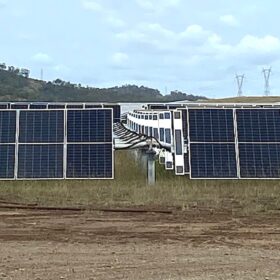A total of $380,389 has been allocated by the Victorian government for the Totally Renewable Yackandandah (TRY) Sanatorium Road Microgrid initiative.
The $932,879 project will increase the number of houses with solar PV and batteries on a Single Wire Earth Return (SWER) powerline and include control technology to manage network security.
It has the potential to be used as a model for other communities to increase local renewable energy generation and alternative models for costly SWER line upgrades.
“This is the third initiative in Yackandandah and a vital one that will target an area with network constraints giving homes access to solar and batteries for energy support,” said Member for Northern Victoria Jaclyn Symes.
The Victorian town of Yackandandah has a community-based goal of reaching 100% renewables by 2022, and a lot has already been done to this end.
Last month, community-run group TRY in partnership with Mondo Power, an independent subsidiary of AusNet Services specialized in commercial and community distributed energy offerings, launched a second solar and battery purchasing offer.
The focus of Stage Two offer was scaling of battery ready solar installations across the Yackandandah area, following hot on the heels of Stage One offering which saw more than 550kW of solar generation added to the area.
Further plans of TRY and Mondo Power include securing financial subsidies for additional batteries across the local network, finessing plans to launch a community energy retailer to drive the energy sharing future and working on projects to install scaled generation across the region.
The Sanatorium Road Microgrid project funding is undoubtedly a significant milestone towards the community’s goal.
“This microgrid project will boost the development of cleaner, cheaper renewable energy in Yackandandah,” said Minister for Energy Lily D’Ambrosio.
The Yackandandah microgrid funding is part of the Victorian government statewide investment in the technology.
Announced in December 2017, the Microgrid Demonstration Initiative grant program has provided $10 million to support eight state-wide microgrid projects totaling over $37 million in project value.
As part of the same initiative, the government has announced funding for the Ovida Community Energy Hub project, which will install shared solar PV and battery systems in three multi-tenanted buildings in Melbourne, the Birchip Cropping Group’s solar PV+battery microgrid in the Wimmera and Mallee region, and the 5 MW VPP, which will see solar and battery systems of up to 650 residential and commercial properties across the state connected by Origin Energy.
The initiative is is part of its $146 million Renewable Energy Action Plan, launched with an eye on Victoria’s ambitious Renewable Energy Targets of 25% by 2020 and 40% by 2025.
This content is protected by copyright and may not be reused. If you want to cooperate with us and would like to reuse some of our content, please contact: editors@pv-magazine.com.








2 comments
By submitting this form you agree to pv magazine using your data for the purposes of publishing your comment.
Your personal data will only be disclosed or otherwise transmitted to third parties for the purposes of spam filtering or if this is necessary for technical maintenance of the website. Any other transfer to third parties will not take place unless this is justified on the basis of applicable data protection regulations or if pv magazine is legally obliged to do so.
You may revoke this consent at any time with effect for the future, in which case your personal data will be deleted immediately. Otherwise, your data will be deleted if pv magazine has processed your request or the purpose of data storage is fulfilled.
Further information on data privacy can be found in our Data Protection Policy.